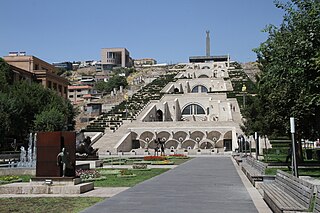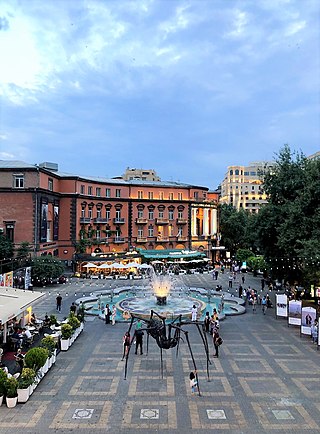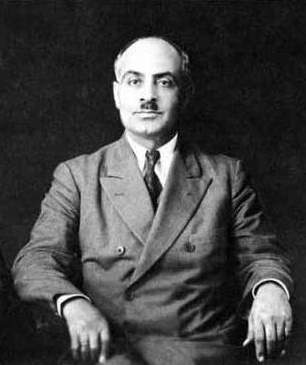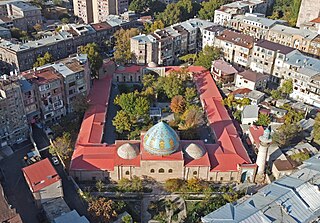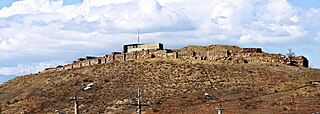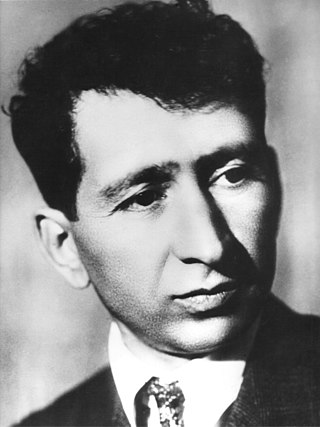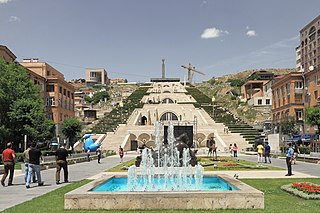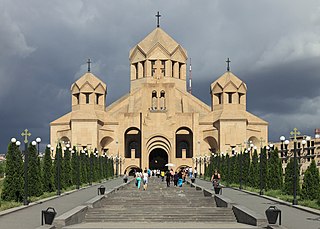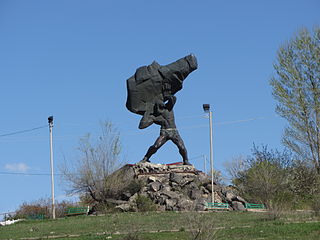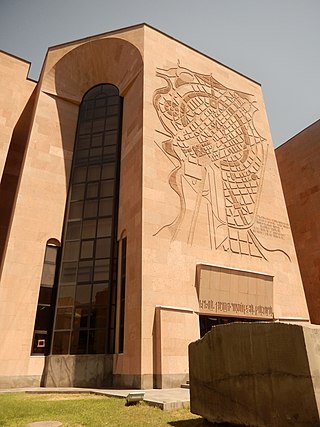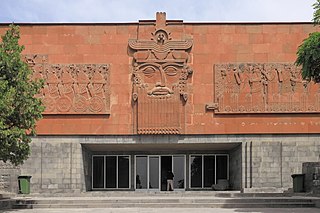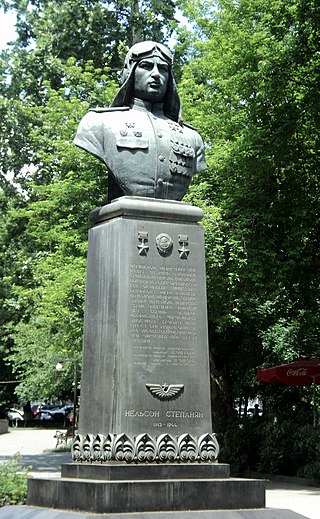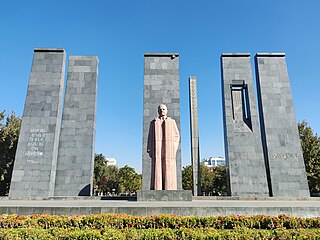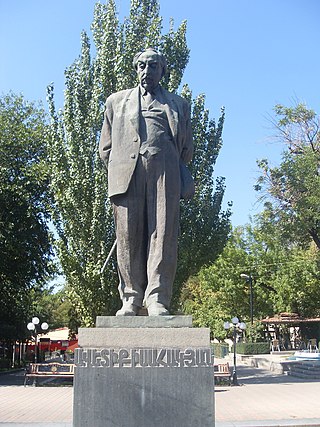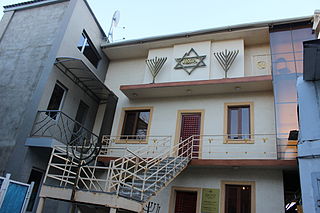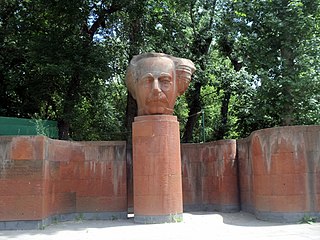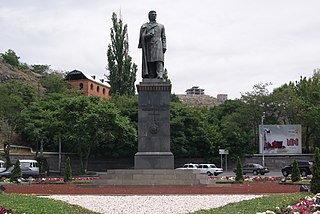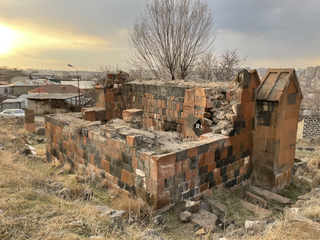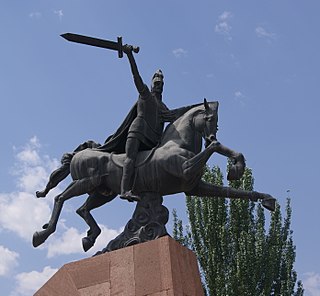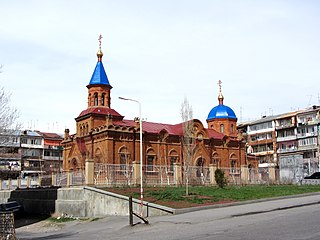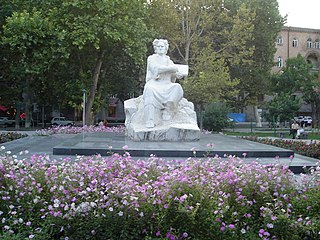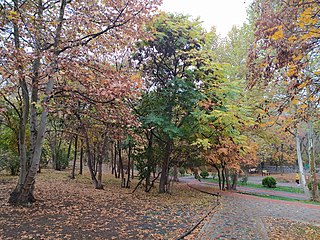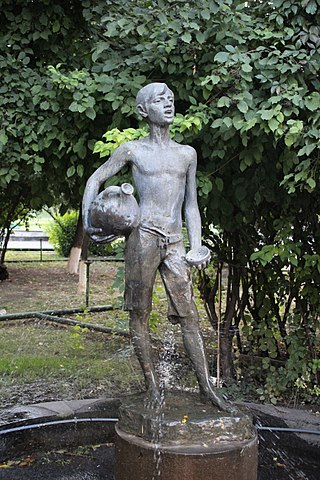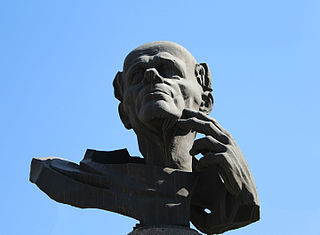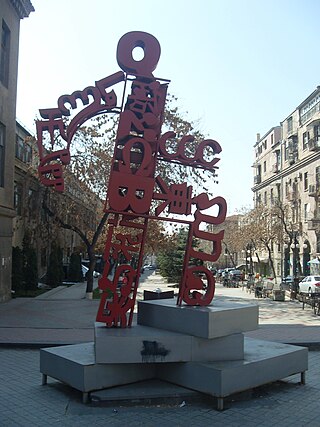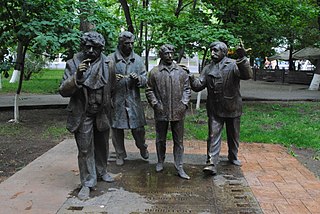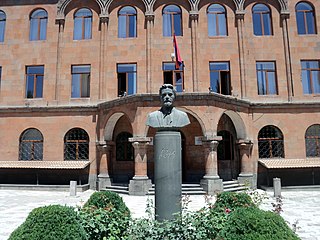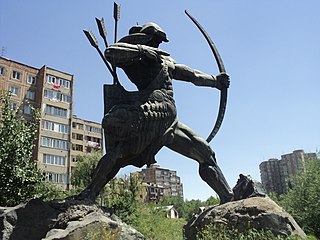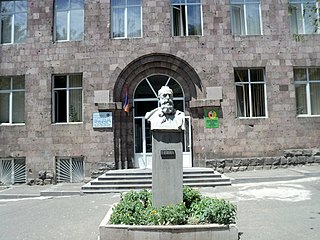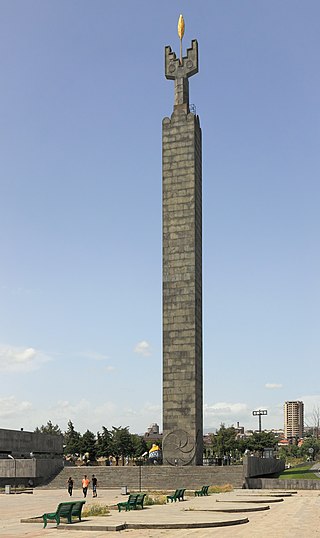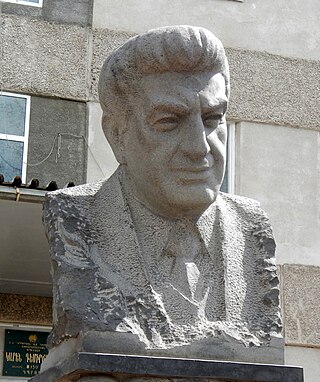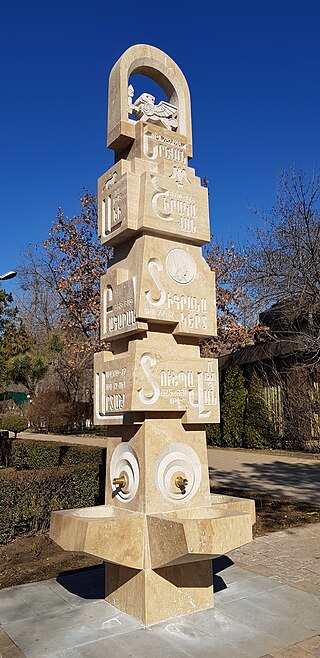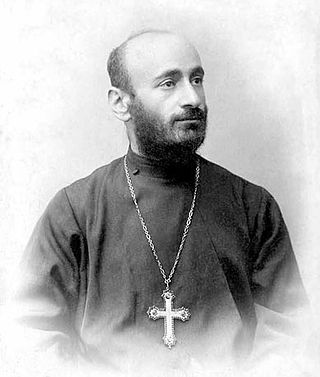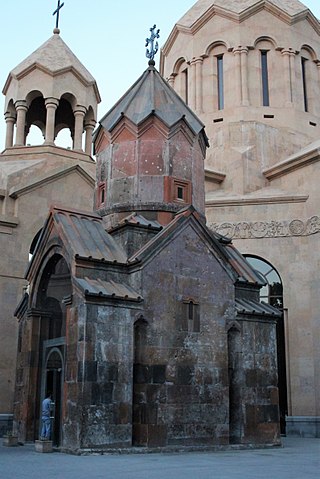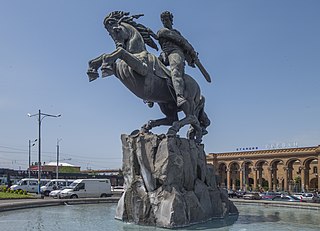39 Sights in Yerevan, Armenia (with Map and Images)
Legend
Premium Sights
Book tickets, guided tours and activities in Yerevan.
Guided Free Walking Tours
Book free guided walking tours in Yerevan.
Welcome to your journey through the most beautiful sights in Yerevan, Armenia! Whether you want to discover the city's historical treasures or experience its modern highlights, you'll find everything your heart desires here. Be inspired by our selection and plan your unforgettable adventure in Yerevan. Dive into the diversity of this fascinating city and discover everything it has to offer.
Sightseeing Tours in YerevanActivities in Yerevan1. Cascade
The Cascade is located in Yerevan, Armenia. White travertine stone was used for building the complex since only this stone was available in the amount sufficient for such a large-scale construction. The Yerevan’s Cascade is situated in the northern part of the city center near the Opera House and Matenadaran. It connects the city center with the Victory Park, which commemorates the Soviet Army’s victory over Nazi Germany in World War II. There is a square on the top of a hill overlooking the Ararat Valley and downtown Yerevan. The park features the Mother Armenia statue that houses a military museum dedicated to the history of World War II and the Nagorno-Karabakh conflict. The Cascade consists of 5 hillside terraces connected with 572 steps. The building is 302 m high, 50 m wide, and has a total area of 13 hectares with a 15-degree slope. The uppermost platform is called the Monumental Terrace. It houses the 40th Anniversary of Soviet Armenia monument standing 118 m tall. The terrace consists of a zone bordered by 15 columns symbolically reflecting Armenia's historical heritage. Each floor and sector of the external staircase is a unique work of art. In the inner part of the building, there are elevators and escalators connecting all platforms from the foundation to the top. The entire territory of the architectural heritage is an open-air museum of modern art lying amid the green space. It is a complex of massive stairs with fountains that rise from the Tamanyan Street pedestrian area in the central Kentron district.
2. Charles Aznavour Square
Charles Aznavour Square is a small square in the Kentron District of the Armenian capital Yerevan. The square is named in honour of the French Armenian singer Charles Aznavour as part of the celebrations of the 10th anniversary of Armenian independence in 2001. The square adjacent to Abovyan Street includes a number of important venues including Stanislavski Russian Theatre of Yerevan, the Moscow Cinema, the Artists' Union of Armenia offices. Grand Hotel Yerevan on Abovyan Street also overlooks the square. The square also hosted the Yerevan Vernissage before the latter moved to its present location.
3. Garegin Nzhdeh
Garegin Ter-Harutyunyan, better known by his nom de guerre Garegin Nzhdeh, was an Armenian statesman, military commander and nationalist revolutionary. As a member of the Armenian Revolutionary Federation, he was involved in the national liberation struggle and revolutionary activities during the First Balkan War and World War I and became one of the key political and military leaders of the First Republic of Armenia (1918–1921). He is widely admired as a charismatic national hero by Armenians.
4. Blue Mosque
The Blue Mosque is an 18th-century Persian Shia mosque in Yerevan, Armenia. It was commissioned by Hoseyn Ali Khan, the khan of the Iranian Erivan Khanate. It is one of the oldest extant structures in central Yerevan and the most significant structure from the city's Iranian period. It was the largest of the eight mosques of Yerevan in the 19th century and is the only active mosque in Armenia today.
5. Matenadaran of Yerevan
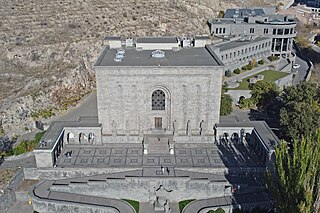
The Matenadaran, officially the Mesrop Mashtots Institute of Ancient Manuscripts, is a museum, repository of manuscripts, and a research institute in Yerevan, Armenia. It is the world's largest repository of Armenian manuscripts.
6. Erebuni Fortress
Erebuni Fortress is an Urartian fortified city, located in Yerevan, Armenia. It is 1,017 metres (3,337 ft) above sea level. It was one of several fortresses built along the northern Urartian border and was one of the most important political, economic and cultural centers of the vast kingdom. The name Yerevan itself is derived from Erebuni.
7. E. Charents
Yeghishe Charents was an Armenian poet, writer and public activist. Charents' literary subject matter ranged from his experiences in the First World War, the Russian Revolution, and frequently Armenia and Armenians. He is recognized as "the main poet of the 20th century" in Armenia.
8. Cafesjian Sculpture Garden
The Cafesjian Center for the Arts is an art museum in Yerevan, Armenia. It is located at the central Kentron District, in and around the Yerevan Cascade which is a complex of massive staircase with fountains, ascending up from the Tamanyan Street gardens and pedestrian zone.
9. Saint Gregory the Illuminator Cathedral
The Saint Gregory the Illuminator Cathedral, also known as the Yerevan Cathedral is the largest cathedral of the Armenian Apostolic Church. It is located in the Kentron District of Yerevan, the capital of Armenia, and is one of the largest religious buildings in the South Caucasus along with the Holy Trinity Cathedral of Tbilisi. Adjacent to the General Andranik metro station, it is visible from many areas of Yerevan.
Wikipedia: Saint Gregory the Illuminator Cathedral, Yerevan (EN)
10. Torq Angegh
Tork Angegh is a deity of strength, courage, manufacturing and the arts in Armenian mythology. A creature of unnatural strength and power, Tork was considered one of the great-grandsons of Hayk, the legendary patriarch of the Armenian people. He was reportedly represented as an unattractive male figure. He is mentioned by the early Armenian historian Movses Khorenatsi and is considered one of the significant deities of the Armenian pantheon prior to the time when it came under influence by Iranian and Hellenic religion and mythology. Taken in the context of Proto-Indo-European religions, it is conceivable that an etymological connection with Thor and Týr is more than a simple coincidence.
11. Yerevan History Museum
The Yerevan History Museum is the history museum of Yerevan, the capital city of Armenia. The museum was founded in 1931 as the Communal Museum. Currently, the museum is located in a building attached to the Yerevan City Hall. The architect of the building was Jim Torosyan.
12. Khachatur Abovyan statue
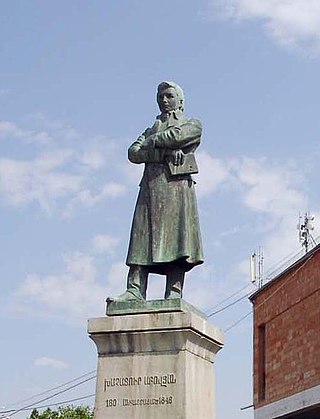
A monument to Khachatra Abovyan, located near Kh. Abovyan's home museum in the Kanaker district of Armenia, was installed on Abkhaz Street in 1933, and then moved several times. The current location was installed in September 1964. Included in the History and Cultural Monuments List of the administrative district of Canyon-Zaitun, Armenia.
Wikipedia: Խաչատուր Աբովյանի հուշարձան (Երևան, Քանաքեռ) (HY)
13. Erebuni Museum-Reservation
Erebuni Historical-Archaeological Reserve-Museum, was established in 1968. The opening of the museum was timed to coincide with the 2750th anniversary of Yerevan. The Museum stands at the foot of the Arin Berd hill, on top of which the Urartian Fortress Erebouni has stood since 782 BCE. The city-fortress was excavated, some parts of the structure were reinforced and restored, and the fortress was turned into an outdoor museum.
14. Nelson Stepanyan
Nelson Stefanov's semicircle, located in a children's park between Moses Mukhtar, Gregory Lucifer, Beirut, and Zachian streets in the center of Yerevan, was installed in 1950. Included in the History and Cultural Monuments List of the Central Administrative Region of Armenia.
15. Aleksandr Myasnikyan Monument
A monument to Alexander Myasikyan, located in Yerevan, was erected in 1980 in honor of the Armenian Party, political, and socialist Alexander Myasikyan. Included in the History and Cultural Monuments List of the Central Administrative Region of Armenia.
16. Avetik Isahakyan
A monument to the Gospel of Isaac, It is located in the heart of Yerevan, adjacent to the Moscow, Isaac, and Abkhaz streets, just outside the Youth Station in 1965. Included in the History and Cultural Monuments List of the Central Administrative Region of Armenia.
17. Mordechai Navi Synagogue
Mordechai Navi Synagogue, also called the Mordechai Navi Jewish Centre, is a Jewish congregation and synagogue, located at 23 Nar Dos Street, in the central Kentron district of Yerevan, the capital of Armenia. The synagogue was opened in June 2011.
18. Գաբրիել Սունդուկյան
A monument to Gabriel Sundukyan is located in front of the Academy Theater of Gabriel Sundukyan in the English Garden of Armenia, Comaig, in 1972. Included in the History and Cultural Monuments List of the Central Administrative Region of Armenia.
19. Khachatur Abovyan monument
A monument to Khachatra Abovyan is located at the end of Abkhazia Street in central Yerevan, Abkhazia, in 1950. Included in the History and Cultural Monuments List of the Central Administrative Region of Armenia.
Wikipedia: Խաչատուր Աբովյանի հուշարձան (Երևան, Աբովյան պուրակ) (HY)
20. Սուրբ Հովհաննես եկեղեցի
Holy John Church, a humbled Armenian Apostolic Church in the northeastern part of the Avan Community of Armenia (Vd.). A cross is depicted on the entrance bar. Numerous patterned crosses engraved on the walls of the church have been preserved. Monuments, stones, and medieval cemeteries are preserved around the church. On the left side of the church yard is a scroll-covered cross.
21. Vardan Mamikonyan statue
A monument to Vardar Mamikonian, located in the Oak Park in Armenia, adjacent to the Vardaran and Changyan Roads, was installed in 1975. Included in the History and Cultural Monuments List of the Central Administrative Region of Armenia.
22. Church of the Intercession of the Holy Mother of God
The Church of the Intercession of the Holy Mother of God of Kanaker, is an active Russian Orthodox church in the old area of Kanaker, Yerevan, Armenia. Main church of the Diocese of Yerevan and Armenia.
Wikipedia: Church of the Intercession of the Holy Mother of God (EN)
23. Martiros Saryan monument
A monument to Martyros Saran, It is located in the grove of Martyros Saryan in the center of Yerevan, between the Mauritius, the Marshall Palaces, and the Zoroastrian Road, just outside the street of the great artist's name, in 1986. Included in the History and Cultural Monuments List of the Central Administrative Region of Armenia.
24. Hare on Bell on Portland Stone Piers
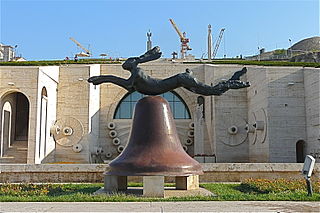
The sailboat on the bell, the full name of the sailor on the Portland stone support bell, A bronze statue of Irish sculptor Berry Flanagan, dated 2005 in the Central District of Armenia, at the Gaffesky Arts Center in the Cascade complex.
25. Circular Park
The Circular Park ; also known as the Youth Park, is a public park in the Kentron district of the Armenian capital Yerevan. It starts with the Cathedral of Saint Gregory at the south on Tigran Mets street, and ends up with the Poplavok lake at the north near Mashtots Avenue. The park lies along Khanjyan, Yervand Kochar, Alex Manoogian, Moskovian and Isahakyan streets, forming a half-circular shaped park around the eastern part of downtown Yerevan. The park has an approximate length of 2500 metres and an average width of 120 metres.
26. The seller of water
A sculpture of the "Waterfall Boy" in the English Garden of Armenia was installed in 1970. Included in the History and Cultural Monuments List of the Central Administrative Region of Armenia. One of the symbols of ancient Yerevan is dedicated to former Bulgarian waterfront teenagers.
27. Andrey Sakharov monument
Andrei Sakharov's monument, located in the square of Sakharov in the center of Yerevan, was erected in 2001. Included in the History and Cultural Monuments List of the Central Administrative Region of Armenia.
28. Book your future
Set up your future, metal sculpture in the city of Armenia. Located in the Central Community at the intersection of the streets of Corinth and Gérard Kokhar, Moscow's Moscow Park, was installed on April 22, 2012. The author of the sculpture is David Minasyan.
29. Yeghishe Charents Monument
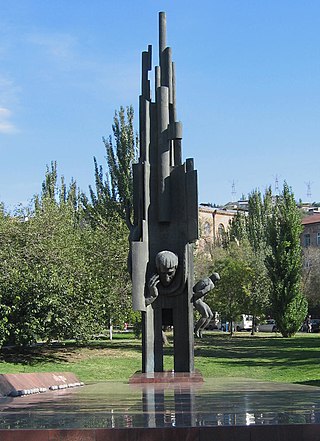
A monument to Eliser Charan, located in the Oak Park in central Yerevan, in front of the radio station, was erected in 1985. Included in the History and Cultural Monuments List of the Central Administrative Region of Armenia.
30. The Men
The Men is a public artwork in Yerevan, the capital of Armenia. Created by Armenian sculptor Davit Minasyan in 2007, it commemorates Edmond Keosayan's 1972 film of the same name, and comprises four statues, depicting the film's stars, the actors Mher Mkrtchyan, Avetik Gevorkyan, Armen Ayvazyan, and Azat Sherents.
31. Anton Chekhov
Antoine Czechoslovakia's semicircle is located in front of the 55th school in the Central Community of Armenia. Included in the History and Cultural Monuments List of the Central Administrative Region of Armenia.
32. Hayk statue
A statue of the patriarch Hayk is located on the 2nd floor of the New York State Administrative Region, near the Gai Palace. The sculpture was originally placed near the Moscow Cinema and then moved to the present location in 1975.
33. Ղազարոս Աղայան
The semicircle of Lazarus Ayyan is located in the Arabian community of Armenia in front of 63 schools named Lazarus Ayyan. The museum was erected in 1955. Included in the History and Cultural Monuments List of the Administrative Region of Armenia.
34. Memorial to Soviet Armenian 50th anniversary
Reborn Armenia, formerly the 50th anniversary of the October Revolution, is located in the administrative district of Arab Emirates, at the beginning of the Liberation Palace, above the Kasada complex.
Wikipedia: Հոկտեմբերյան հեղափոխության 50-ամյակի հուշարձան (Երևան) (HY)
35. Կարեն Դեմիրճյան
Karen Demirgyan's semicircle is located in front of 139 schools named Karen Demirgyan in the New York State Administrative Region of Armenia. The school was founded in 1968. In 2002, he was named after Karen Demirgyan, Armenia's national hero. The museum was installed in 2003. The sculptor is Hamlet Matthias.
36. Names of Armenian capitals
A monument dedicated to the 2,800th anniversary of the Armenian Capitals. It is located in the administrative district of Arab Emirates, Armenia, in the name of Vahan Davidyan. The museum was placed among the 2,800th anniversary of the festivities in Yerevan in 2018.
37. Komitas statue
Soghomon Soghomonian, ordained and commonly known as Komitas, was an Ottoman-Armenian priest, musicologist, composer, arranger, singer, and choirmaster, who is considered the founder of the Armenian national school of music. He is recognized as one of the pioneers of ethnomusicology.
38. Katoghike Church
The Church of the Holy Scriptures in Catholicism is one of the ancient churches of Yerevan. It is located at the intersection of the streets of present-day Abkhazia and Sait-Nova in the center of Yerevan. Later built in the medieval basilica, the ancient structure of the native Yerevan is the oldest structure in Yerevan that has never been destroyed, even during the 1679 earthquake.
39. David of Sasun
David of Sassoun is a copper equestrian statue depicting David of Sassoun in Yerevan, Armenia. Erected by the sculptor and artist Yervand Kochar in 1959, it depicts the protagonist of the Armenian national epic Daredevils of Sassoun. It is placed on a rock-like basalt pedestal in the middle of a large square in front of Yerevan's main railway station.
Share
Disclaimer Please be aware of your surroundings and do not enter private property. We are not liable for any damages that occur during the tours.
